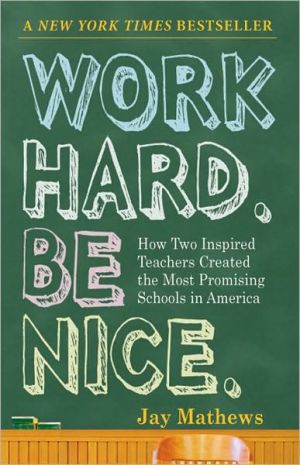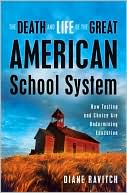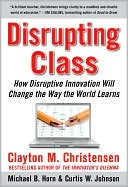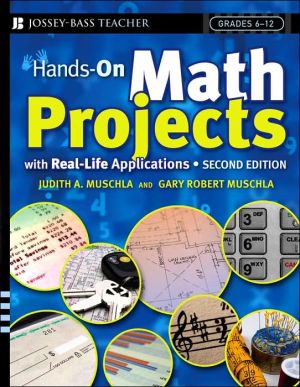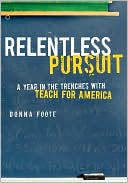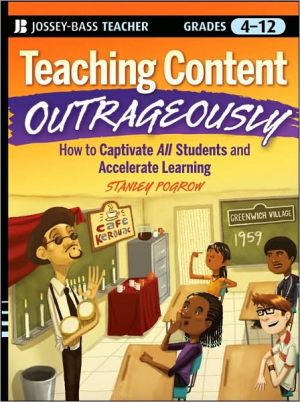Work Hard. Be Nice.: How Two Inspired Teachers Created the Most Promising Schools in America
When Mike Feinberg and Dave Levin signed up for Teach for America right after college and found themselves utter failures in the classroom, they vowed to remake themselves into superior educators. They did that—and more. In their early twenties, by sheer force of talent and determination never to take no for an answer, they created a wildly successful fifth-grade experience that would grow into the Knowledge Is Power Program (KIPP), which today includes sixty-six schools in nineteen states...
Search in google:
When Mike Feinberg and Dave Levin signed up for Teach for America right after college and found themselves utter failures in the classroom, they vowed to remake themselves into superior educators. They did that—and more. In their early twenties, by sheer force of talent and determination never to take no for an answer, they created a wildly successful fifth-grade experience that would grow into the Knowledge Is Power Program (KIPP), which today includes sixty-six schools in nineteen states and the District of Columbia. KIPP schools incorporate what Feinberg and Levin learned from America's best, most charismatic teachers: lessons need to be lively; school days need to be longer (the KIPP day is nine and a half hours); the completion of homework has to be sacrosanct (KIPP teachers are available by telephone day and night). Chants, songs, and slogans such as "Work hard, be nice" energize the program. Illuminating the ups and downs of the KIPP founders and their students, Mathews gives us something quite rare: a hopeful book about education. The Washington Post - Richard D. Kahlenberg Work Hard. Be Nice provides a fast-paced, engrossing and heartening story of two phenomenally dedicated teachers who demonstrate that low-income students, if given the right environment, can thrive academically.
First Period Starting Out, or A Tale of Two TeachersSecond Period Starting KIPPThird Period Starting Two SchoolsFourth Period Starting Many Schools
\ Slate“The improbable story of how KIPP was founded in 1994 by David Levin and Michael Feinberg, two young Teach for America alumni in Houston, is thrilling and worthy reading.”—Slate\ \ \ \ \ USA Today“A vivid account of two young men who transform themselves from ‘terrible’ first-year teachers into visionaries.”–USA Today\ \ \ \ World magazine"A lively account of the way two young guys with more passion than knowledge overcame bureaucratic and financial barriers, garnered knowledge from experienced teachers, and made those ideas and techniques core KIPP ideas. Mathews makes his book as entertaining as any novel by weaving personal and professional stories and by surrounding his two stars with interesting characters." —World magazine\ \ \ \ \ \ Richard D. KahlenbergWork Hard. Be Nice provides a fast-paced, engrossing and heartening story of two phenomenally dedicated teachers who demonstrate that low-income students, if given the right environment, can thrive academically.\ —The Washington Post\ \ \ \ \ Publishers Weekly"Many people in the United States believe that low-income children can no more be expected to do well in school than ballerinas can be counted on to excel in football," begins Washington Post education reporter Mathews (Escalante: The Best Teacher in America). He delves into the Knowledge Is Power Program (KIPP) and follows the enterprise's founders, Mike Feinberg and Dave Levin, from their days as young educators in the Teach for America program to heading one of the country's most controversial education programs running today. Luckily for many low-income children, Feinberg and Levin believed that with proper mentors, student incentives and unrestrained enthusiasm on the part of the teachers, some of the country's poorest children could surpass the expectations of most inner-city public schools. Mathews emphasizes Feinberg and Levin's personal stakes in the KIPP program, as they often found themselves becoming personally involved with the families of their students (in one case Feinberg took the TV away from a student's apartment because the student's mother insisted that she could not stop her child from watching it). Mathews innate ability to be at once observer and commentator makes this an insightful and enlightening book. (Jan.)\ Copyright © Reed Business Information, a division of Reed Elsevier Inc. All rights reserved.\ \ \ \ \ Library JournalMathews's (Escalante: The Best Teacher in America) book follows the lives of the two educators who founded the successful Knowledge Is Power Program (KIPP), a system of 65 schools that have revolutionized inner-city education. In 1995, Dave Levin and Mike Feinberg, tired of urban classroom chaos, came up with KIPP to help guarantee student success from grade school to college. They fought against classroom apathy, and reached out to students through homework assistance over the phone and regular home visitations with parents. The result has been an increasing group of self-motivated inner-city kids who have raised expectations for themselves and their future. However, it wasn't easy. Levin and Feinberg were constantly tested by unbending educational bureaucrats, uncooperative parents, and budget constraints. Though the book's writing structure is a bit scattered and repetitive, it does well to convey how KIPP continues to change lives despite criticism from outsiders. Suitable for public libraries.\ —Karen Long\ \ \ \ \ \ Kirkus ReviewsWashington Post education writer Mathews (Supertest, 2005, etc.) follows two dynamic teachers as they develop an effective school system tailor-made for "children stuck at the bottom of our public education system."Mike Feinberg, 23, and Dave Levin, 22, met in 1992 while working for Teach for America, an idealistic program these novice educators found of little help in coping with overcrowded classrooms serving desperately poor populations. So in 1994 they launched their own initiative, the Knowledge Is Power Program (KIPP), which offered fifth- to eighth-grade students from low-income families the chance to learn beyond what other instructors believed they could handle. The first classroom was in north Houston, but Levin soon moved on to the South Bronx. Mathews depicts both men as headstrong and protective of their students. Feinberg became known as an "unholy nuisance," and Levin continually locked horns with school administrators. The tools they employed to motivate students included incentive "paychecks" for good grades and behavior, "porching" (in-class sequestering) to discipline unruly students, commitment agreements among teachers, parents and students, and class field trips. Intermittent anarchy and chaos eventually subsided, test scores began to soar and so did media attention, including a 60 Minutes segment on KIPP. Interspersed among the chronicle of Feinberg and Levin's struggle to galvanize support for their program are three chapters detailing the progress of reluctant fifth-grade football hopeful Jaquan Hall from poorly educated misfit to responsible student. Mathews does a smart, respectable job here. Frankly elucidating the major struggles and roadblocks inherent inattempting to reform how underprivileged children are taught, he nonetheless leaves readers convinced of the truth in Levin's idealistic statement on his Teach for America application: "an educator could change lives."A grand example of humanitarianism in the classroom: Naysayers who believe there's no hope for America's inner-city schools haven't met Feinberg and Levin.\ \
